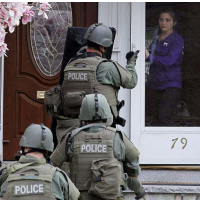Supreme Court Gives Police More Leeway to Search Homes without a Warrant
 Police proceeding with a warrantless search (photo: AP/Reuters)
Police proceeding with a warrantless search (photo: AP/Reuters)
The U.S. Supreme Court has decided that law enforcement can search a person’s home even if they: (1) don’t have warrant, (2) if an occupant objects, and (3) the situation does not warrant an emergency.
That’s the new legal standard established by the nation’s highest court in a case involving the Los Angeles Police Department (LAPD).
In 2009, officers showed up at the residence of Walter Fernandez, who was suspected of committing a robbery.
The police did not have a court order to search Fernandez’s home. The suspect refused to grant officers permission to search the premises before they arrested him on the robbery charge.
With Fernandez in custody, officers returned to his apartment a short while later and asked another occupant, Roxanne Rojas, who was living with the suspect, if they could enter and search the home.
Rojas’ consent was sufficient enough for the LAPD to legally conduct its search, which turned up a shotgun and evidence of Fernandez involvement with gangs, according to the Supreme Court in a 6-3 ruling (pdf).
Justice Samuel A. Alito Jr. wrote for the majority that home searches are legal and do not violate the Fourth Amendment’s right against unreasonable searches as long as one occupant agrees, even if another does not.
“A warrantless consent search is reasonable and thus consistent with the 4th Amendment irrespective of the availability of a warrant,” Alito wrote. “Even with modern technological advances, the warrant procedure imposes burdens on the officers who wish to search [and] the magistrate who must review the warrant application.”
Justices Ruth Bader Ginsburg, Sonia Sotomayor, and Elena Kagan disagreed with the court, saying the ruling weakens the requirement to obtain search warrants.
“Instead of adhering to the warrant requirement, today’s decision tells the police they may dodge it,” Ginsburg said.
“If a person’s health and safety are threatened by a domestic abuser, exigent circumstances would justify immediate removal of the abuser from the premises, as happened here,” she added.
But, “the specter of domestic abuse hardly necessitates the diminution of the Fourth Amendment rights at stake here,” Ginsburg wrote.
-Noel Brinkerhoff
To Learn More:
Supreme Court Sides with LAPD in Warrantless House Search (by David G. Savage, Los Angeles Times)
Supreme Court Narrows Right to Object to a Police Search of Suspect's Home (by Warren Richey, Christian Science Monitor)
Fernandez v. California (Supreme Court of the United States) (pdf)
Supreme Court Votes 5-4 to Require Warrant to Use Drug-Sniffing Dogs Outside a Home (by Noel Brinkerhoff and Danny Biederman, AllGov)
FCC Claims Right to Warrantless Searches (by Noel Brinkerhoff, AllGov)
- Top Stories
- Unusual News
- Where is the Money Going?
- Controversies
- U.S. and the World
- Appointments and Resignations
- Latest News
- Trump Offers to Return Alaska to Russia
- Musk and Trump Fire Members of Congress
- Trump Calls for Violent Street Demonstrations Against Himself
- Trump Changes Name of Republican Party
- The 2024 Election By the Numbers






Comments